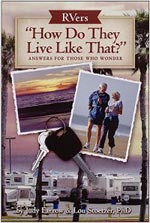How Do They Live Like That? by Alice Zyetz
Most RV books and magazine articles address the how-to issues: how to get your mail, how to select an RV, how to find places to park, how to fix any physical system that will fail, and, of course, where to travel next. After ten years of traveling, I have learned from my experiences and others' that the hardest "system" to fix is the human one. For many people who have lived long and fruitful lives together in a house with a number of rooms and a life with a number of separate activities, being thrust together in one box twenty-four hours a day, seven days a week, many months in a row can be a shock. Some books do address these issues, but very briefly.
In How Do They Live Like That? Answers for Those Who Wonder, former family counselors Judy Farrow and Lou Stoetzer have created a unique book describing the human interactions inside the tin boxes we inhabit. Dr. Ludy, as they refer to themselves, apply their years of professional knowledge, their own nine years' experience on the road, and their eighteen-month research project with RVers. The result is a book full of insight and suggestions to help RVers deal with each other, their families and friends left behind, and other life issues, including their health, aging on the road, and finally hanging up the keys.
|
What especially appeals to me is that the authors describe all issues in detail and then offer tools to resolve those issues. For the couple who must adapt to the smaller space, Dr. Ludy recommends the "RV Two Step," a dance where partners inhale, slide, and dip as they pass each other in close spaces. This is part of Road Tool #2-Make Room for You. They recommend finding private space, even using the bathroom as a place to read the morning newspaper, for example. In our own experience, we found that just putting down the awning created a private space for my husband as he sat outside while I drank my coffee inside getting my news fix from CNN.
Because many RVers retire earlier, they not only leave behind their adult children and their grandchildren, they also must deal with their aging parents. Some of Dr. Ludy's suggestions when you are called to respond to a crisis:
- Determine how serious the "crisis" is
- Enlist a trusted relative, neighbor, professional to give you accurate feedback
- If you go back, try to stay in a campground or a bed and breakfast to keep a little time for yourself.
Another concern for RVers is how they will handle health problems on the road. Again Dr. Ludy give excellent recommendations. Their book reflects the common sense approach to life on the road that I have seen in people who are successful RVers, people who are nourished (and nourishing to all those they meet) every day by their choice in lifestyle. They see obstacles as situations they will find solutions for. And they do!
I highly recommend this book to all those who currently live on the road as well as those who are contemplating entering this rich lifestyle. It's a good idea to buy several copies to give to your children, parents, and dear friends who ask, "How DO you live like that?"
Alice Zyetz
6/13/04


 Alice
Zyetz and Jaimie Hall have
been RVing fulltime with their husbands
for more than ten years each. Together
they have published two books on the
RV Lifestyle:
Alice
Zyetz and Jaimie Hall have
been RVing fulltime with their husbands
for more than ten years each. Together
they have published two books on the
RV Lifestyle: